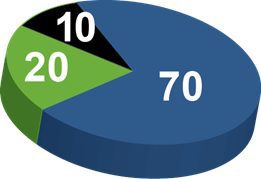70:20:10 Model for Learning and Development
The 70:20:10 Model for Learning and Development is based on research by Michael M. Lombardo and Robert W. Eichinger, which found that learning and development is most effective when information is presented in a combination of different ways, specifically when about:
- 70% is structured on-the-job learning or learning from experience.
- 20% is relationship-based learning or learning from coworkers and colleagues.
- 10% is formal learning or learning through structured classes, workshops and materials.

You learn the most when you choose diverse learning opportunities that expand your understanding of a topic and provide a chance to practice.
Learning and Development Examples
70: Structured On-the-Job Learning from Experience
- Working on a new project (individually or as part of a team)
- Completing different tasks and receiving feedback
- Following a procedure manual or online tutorial while completing a task
- Taking on a new role or responsibility
- Presenting at a conference
- Developing something new (process, procedure, job aid, etc.)
- Working with a new process, system or piece of equipment
- Completing tasks that usefully challenge someone so they learn something new (known as “stretch” assignments)
- Participating in a countywide project
- Completing research
- Representing your leader at a meeting
- Rotating job assignments within the team, department or county
- Reflecting on your own performance
- Teaching others
20: Learning Through Coworkers or Other Colleagues
- Seeking specific, ongoing feedback and coaching
- Talking with an expert or more experienced person
- Sharing knowledge and insights with other colleagues
- Shadowing
- Presenting to the team following a training course, conference or workshop
- Participating in online forums
- Requesting feedback from your peers
- Mentoring, coaching or teaching other colleagues
- Meeting and talking with others who share your professional interest or a similar role
- Participating in online professional forums
10: Structured Classes, Workshops and Materials
- Attending a course or workshop
- Attending webinars or conferences
- Studying independently
- Reading books, journals or articles
- Completing online learning modules or computer-based training
- Participating in professional associations
- Completing internet research